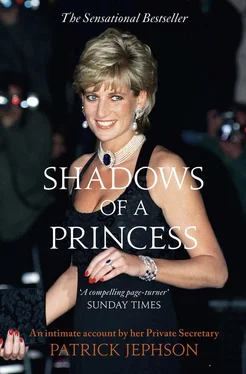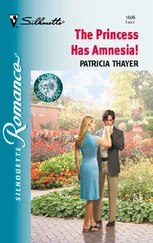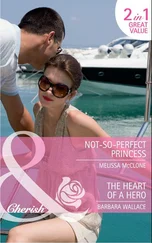She was. I had seen the blue-eyed gaze in photographs, of course, and it lost none of its unsettling power at close range. When I looked again, though, I saw the gaze was tempered by an undeniable friendliness mixed with frank appraisal. In my peripheral vision I noticed some incidental details. She was wearing a cream cotton suit that set off her tan nicely. A bit too many rays on the chest, I thought absently, noticing a rosy tint to the even golden appearance. No jewellery.
Her handshake was cool and firm, my bow instinctive. In the distance somebody was introducing me. ‘It’s good of you to come all this way, Jeph,’ said the Princess. Even as I realized she had only misheard the introduction, I thought how nice it was that she used an old family nickname. As I was to learn, she seemed to have a knack for attracting such happy coincidences.
We went through to the dining room for lunch, and the same sun that had dazzled me in the drawing room bathed our small round table in a golden light. The Princess sat on my left, while Anne and Richard arranged themselves in the other seats. I took stock of my surroundings, trying not to goggle too obviously.
The KP dining room was tall and square, furnished with antiques and softened with pink and peach pastel fabrics. A complicated flower arrangement seemed to burst out of the middle of the table. Silver and crystal sparkled against the crisp whiteness of the napkins. Portraits from the Royal Collection looked down at the scene and I was just practising meeting their regal gaze unblinkingly when a voice on my left diverted my attention to the real thing.
‘I hope you like chicken,’ said the Princess. ‘I’m afraid we seem to have it all the time.’ This was true, I discovered later. At the time I was only aware that, for all I cared, I might have been eating the royal underfelt that no doubt lay beneath the deep-pile carpet. There were tiny potatoes and salad with the chicken, and white wine. I watched the Princess covertly for signs of an eating disorder, even though I had no idea what those signs might be. She seemed to eat like anybody else, and drank the wine too.
I now realized that the energetic flurry of our introduction was an affectation. As she probably intended, her breezy bonhomie blew away our nervousness. It also seemed to dispel an air of preoccupation that had hung about her as she entered the room. In later years I came to recognize the technique, which she often used to shrug off – however temporarily – the cares that beset her.
It was time to practise my small talk. ‘Are you looking forward to going to Germany, Ma’am?’ I had done some research and knew that she and the Prince were due to go on a tour the following week.
She nodded, but without much enthusiasm. ‘It’s an outing for my husband really,’ she said. (It was strange to hear him described like that, and it was the same when I first heard her mention ‘my mother-in-law’ or ‘Granny’.) ‘He gets a chance to meet his old rellies. Half the royal family’s German!’ She giggled. Later, when she was in trouble for buying a German rather than a British sports car, she joked, ‘Well, I’ve got a German husband, why can’t I have a German car?’
For me this was daring stuff. ‘Better be careful,’ I said. ‘Don’t mention the war.’
She laughed again – not because she recognized my Basil Fawlty quote but because she recognized that I had been trying to tell a joke. She laughed as a reflex, whether she understood it or not. Later I learned that she would laugh at anything. Sometimes I thought you could read her the phone book in a funny voice, then look at her expectantly, and she would laugh. She was that desperate to be happy. Happy people laugh a lot, so she would laugh whenever she could – and often when she should not.
This made her a quick pupil for anyone who had the nerve to tell her something really filthy or offensive. That was a double thrill for her – she could be shocked and amused at the same time. Smut was a sure-fire way of getting her to laugh. It would not be a natural, convivial sound, however, but a great, honking, nasal guffaw. The more offensive the joke, the more unattractive would be her reaction. She also enjoyed the shock she could achieve by repeating the worst from her collection. Needless to say, we did not plumb quite those depths on the first day. It took a week at least.
If I had expected a lively, informed debate about the function and purpose of a modern constitutional monarchy, I was wrong. This was a relief, although as a politics graduate I was keen to study the reality at close quarters. I felt like a medical student with a theoretical understanding of anatomy who is suddenly confronted by a real patient. Only in this case, I suspected that the patient was free to prescribe her own treatment.
Our conversation cantered along at a surprisingly easy pace. I gleaned little about my prospective duties, except that one of them at least was to fill a lunchtime with polite chat. Nor was I asked to reveal much about my own background. I assumed this was because she was already well briefed on my personal details, but later I realized she was not really very interested in where I came from, only in whether I would be bearable to have around for a year or so.
Like many of the family into which she had married, she only reluctantly acknowledged that her staff had a life either before or beyond their contact with her. Employees came and went with such rapidity that this was possibly an understandable reaction. Sometimes she certainly did make a conspicuous and generous effort to be a concerned employer – more so, in fact, than most other royal people – but it did not come naturally. In any case, nothing enforces the concept of royalty being different more effectively than a bit of healthy indifference towards the underlings.
The underlings, therefore, had to look after themselves. It did not take me long to realize that, whenever I was uncertain what to do next in any royal situation, usually the best option was to do nothing and enjoy whatever pleasurable compensations were to hand. A sense of humour was essential survival equipment in the palace jungle (but nothing too clever). So was an ability to enjoy food and drink.
To these I secretly added an ability to enjoy plane-spotting. It turned out to be quite useful. Many of my tensest moments were experienced in royal aeroplanes, but surprisingly often I could deflect the Princess’s fiercest rocket with a calculated display of nerdish interest in what I could see out of the window.
As it happened, I was able to indulge this lonely vice almost immediately as I caught the bus back to Heathrow. Farewells at KP were polite but perfunctory and Richard and Anne gave no hint as to the outcome of my interview. Richard ventured the comment that I had given ‘a remarkable performance’, but this only added to the general air of theatrical unreality. I was pretty sure I had eaten my first and last royal Jersey Royal.
Back in Scotland, my despondency deepened as I inhaled the pungent aroma of my allocated bedroom in the Faslane transit mess. It was not fair, I moaned to myself, to expose someone as sensitive as me to lunch with the most beautiful woman in the world and then consign him to dinner with the duty engineer at the Clyde Submarine Base. And how could I ever face the future when every time the Princess appeared in the papers I would say to myself – or, far worse, to anyone in earshot – ‘Oh yes, I’ve met her. Had lunch with her in fact. Absolutely charming. Laughed at all my jokes …’
Now thoroughly depressed, I was preparing for a miserable night’s sleep when I was interrupted by the wardroom night porter. He wore a belligerent expression so convincing that it was clearly the result of long practice. No doubt drawing on years of observing submarine officers at play, he clearly suspected he was being made the victim of a distinctly unamusing practical joke. In asthmatic Glaswegian he accused me of being wanted on the phone ‘frae Bucknum Paluss’.
Читать дальше












